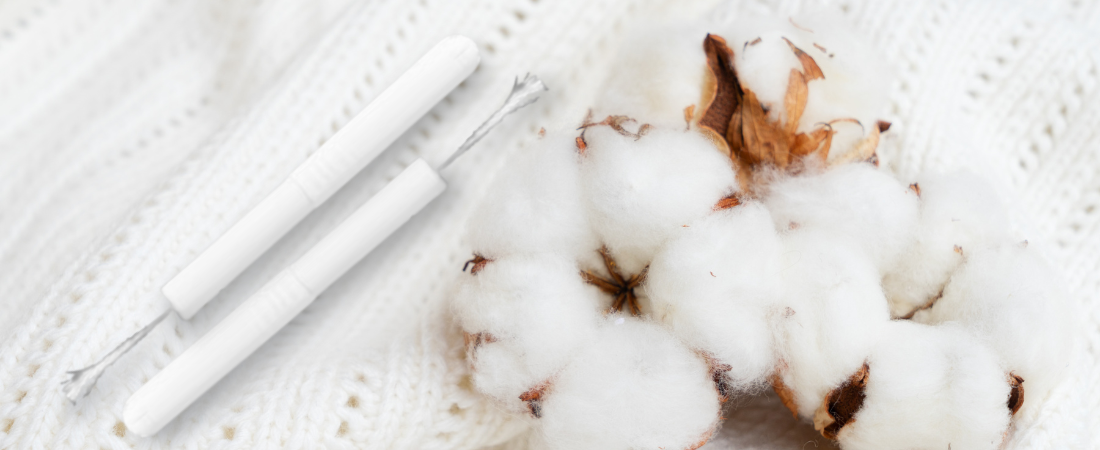In the quest for healthier and more sustainable menstrual care products, organic tampons have gained popularity as a natural alternative to conventional tampons. But what exactly are organic tampons made of? In this article, we’ll explore the ingredients used in organic tampons and why they are considered a healthier, eco-friendly choice for both your body and the environment.
The Basics of Organic Tampons
Organic tampons are designed to offer the same level of comfort and protection as conventional tampons. Still, with an important difference: they are made from 100% certified organic cotton, free from synthetic materials and harmful chemicals.
-
A. Certified Organic Cotton
The main ingredient in organic tampons is certified organic cotton, grown without the use of synthetic pesticides, herbicides, or fertilizers. This ensures that the cotton is pure and free from toxic residues that can be harmful to the body.
- B. No Chemical Additives
The Difference Between Organic and Conventional Tampons
Conventional tampons are often made from a blend of cotton and synthetic materials like rayon, which can contain chemicals and additives that are harmful to both your body and the environment.
-
A. Conventional Tampons
Materials: Conventional tampons are typically made from a mix of cotton and rayon, a synthetic fiber derived from wood pulp.
Chemical Processing: Conventional tampons are often bleached with chlorine, which can leave behind traces of dioxins—potentially harmful chemicals linked to health risks.
Additives: Many conventional tampons contain fragrances, dyes, and other additives that can irritate sensitive skin.
-
B. Organic Tampons
Materials: Organic tampons are made from 100% certified organic cotton, free from synthetic materials and harmful chemicals.
No Chemical Processing: Organic tampons are not bleached with chlorine; instead, they are whitened using safer, non-toxic processes like oxygen-based bleaching.
No Additives: Organic tampons are free from fragrances, dyes, and other chemical additives, making them a gentler choice for women with sensitive skin.
Why Choose Organic Tampons?
Switching to organic tampons can offer several benefits for both your health and the environment. Here are some of the reasons why women are making the switch to organic menstrual products.
-
A. Health Benefits
Reduced Exposure to Chemicals: Organic tampons are free from synthetic materials and chemical additives, reducing the risk of irritation, allergic reactions, and other health concerns.
Hypoallergenic: Organic cotton is less likely to cause allergic reactions, making it a safer option for women with sensitive skin or conditions like vulvodynia.
Breathability: Organic cotton is more breathable than synthetic materials, helping to maintain a healthy vaginal environment and reduce the risk of infections.
-
B. Environmental Benefits
Sustainable Farming Practices: Organic cotton is grown using environmentally friendly farming methods that avoid the use of harmful pesticides and promote biodiversity.
Biodegradable: Unlike tampons made from synthetic materials, organic tampons are fully biodegradable, reducing the amount of waste that ends up in landfills.
Lower Carbon Footprint: The production of organic cotton requires less water and energy than conventional cotton, contributing to a lower carbon footprint.
Understanding Organic Certifications
When choosing organic tampons, it’s important to look for products that are certified by reputable organizations. Organic certification ensures that the cotton used in the tampons meets strict environmental and social standards.
-
A. GOTS (Global Organic Textile Standard)
GOTS certification is one of the most trusted organic certifications for textiles. It guarantees that the cotton used in organic tampons is grown and processed according to strict environmental and social criteria, including the prohibition of toxic chemicals and the promotion of fair labor
-
B. ICEA (Institute for Ethical and Environmental Certification)
The ICEA certification ensures that organic tampons are made from materials that meet high environmental and ethical standards. This certification also ensures that the production process minimizes the impact on ecosystems and promotes worker welfare.
How Organic Tampons Support Ethical and Sustainable Choices
By choosing organic tampons, you are not only making a healthier choice for yourself but also supporting ethical and sustainable practices in the textile and personal care industries.
-
A. Protecting Farm Workers
The use of organic cotton helps protect farm workers from exposure to harmful pesticides and chemicals, which are commonly used in conventional cotton farming. Organic farming promotes healthier working conditions and fair labor practices.
-
B. Supporting Sustainable Agriculture
Organic cotton is grown using methods that promote soil health, water conservation, and biodiversity. By choosing organic products, you are supporting sustainable agricultural practices that help protect the environment.
-
C. Reducing Plastic Waste
Many conventional tampons come with plastic applicators or are individually wrapped in plastic. Organic tampons often come with biodegradable applicators or no applicator at all, helping to reduce plastic waste.
Conclusion
Organic tampons are made from 100% certified organic cotton, offering a healthier and more sustainable alternative to conventional tampons. Free from harmful chemicals and synthetic materials, organic tampons are gentle on the body and the environment. By choosing organic tampons, you can reduce your exposure to toxic chemicals, support ethical farming practices, and contribute to a cleaner planet.


